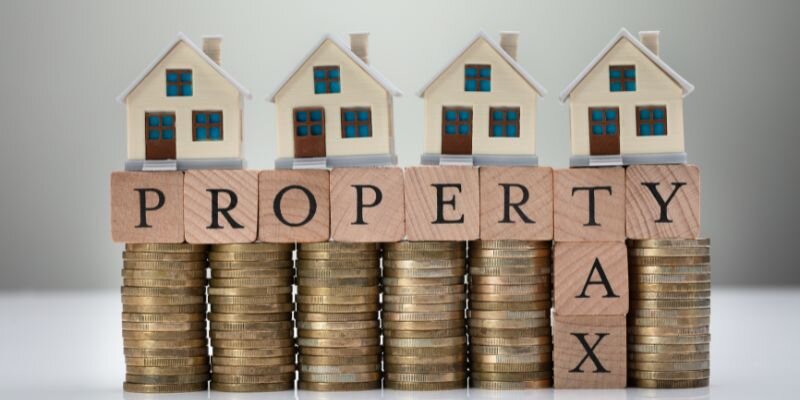
Understanding Capital Gains Tax: Selling Your Home in Bloomington
It’s important to know what capital gains tax means when you sell your house in Bloomington. This tax is based on the profit you make when you sell a property, so it’s important to know how it will influence your finances.
The Internal Revenue Service (IRS) lets people in Bloomington and other parts of the US not pay taxes on some capital gains from selling their main home. If you have lived in your Bloomington home for at least two of the last five years before selling it, you may be able to get an exclusion of up to $250,000 if you are single or $500,000 if you are married and filing jointly.
However, understanding specific criteria and documentation is important to ensure eligibility. We calculate the capital gains by subtracting your home’s adjusted basis, which includes the original purchase price and any improvements, from the sale price.
Keeping detailed records of all significant home improvements can reduce potential taxable gains significantly. If you have used part of your home for business or rented it out, this may affect your tax when selling your Bloomington property.
A tax expert who is familiar with the intricacies of the real estate market may provide insightful advice on how to reduce your capital gains obligation and maximize your sale proceeds.
Navigating Property Tax Obligations for Bloomington Home Sellers
Selling a home in Bloomington involves understanding of property tax obligations that can impact your financial outcome. When navigating the process, it’s crucial to be aware of local property tax rates and any applicable exemptions or deductions that may apply.
When selling a home, the seller should think about how the property taxes will be split between the buyer and seller at closing. This way, everyone will pay their fair share for the year. Also, if the property’s value has gone up a lot since you bought it, you need to know about possible capital gains taxes.
Familiarity with specific tax regulations can help sellers accurately estimate their net proceeds and avoid unexpected liabilities. Consulting with a knowledgeable real estate professional or tax professional who understands Bloomington’s market can offer invaluable tips for managing these obligations effectively during the sale process.
How to Calculate Real Estate Transfer Taxes in Bloomington
It is very important to know how to figure out real estate transfer taxes when you are selling your home in Bloomington,. There is a tax on the transfer of land ownership that sellers need to know about when they figure out how much money they made in the end.
In Bloomington, these real estate transfer taxes are based on the sale price of the property and are typically included in the closing costs. To accurately determine the amount owed, you must consider both state and local tax rates that apply specifically to Monroe County, where Bloomington is located.
To start the process, you need to look over the current tax rules or talk to a local real estate expert who can give you specific information about any extra city fees that may apply. For buyers to avoid surprises at the closing, they should plan their finances so that these costs are taken into account.
By getting an accurate estimate of their real estate transfer taxes, landlords can make sure they follow the law and get the most money out of the sale.
Strategies to Minimize Taxes When Selling a House

When selling a house in Bloomington, understanding strategies to minimize taxes can be crucial for homeowners. One effective approach is to take advantage of the tax exclusion for home sales, which allows eligible sellers to exclude up to $250,000 of capital gains from taxation if they are single or $500,000 if they are married and filing jointly.
For this exemption to apply, the home had to have been the main residence for at least two of the five years before it was sold. Homeowners should also think about when to sell their homes strategically. For example, selling during a year with lower income might help lower their total tax bill.
Keeping meticulous records of home improvements can also offset capital gains by increasing the property’s adjusted cost basis. Additionally, consulting a tax professional who understands specific tax laws and regulations can provide personalized advice that ensures compliance while maximizing savings.
Exploring potential deductions related to moving expenses or real estate transaction fees may further aid in reducing taxable income associated with the sale.
Key Tax Deductions for Bloomington Homeowners During a Sale
When selling a home in Bloomington, understanding key tax deductions can significantly impact your financial outcome. Homeowners should be aware that certain expenses incurred during the sale process may qualify as tax deductions, potentially lowering taxable gains.
One important deduction is the cost of repairs and renovations made to a home to make it more valuable before selling it. These costs can be added to the home’s adjusted basis, which lowers capital gains. Real estate experts commissions are also usually tax-deductible as selling costs.
Legal fees, title insurance, and advertising costs associated with the sale also qualify as deductible expenses. If you recently refinanced your mortgage and paid points to reduce your interest rate, you might be able to deduct any remaining unamortized points on the mortgage when you sell your home.
Bloomington homeowners need to keep thorough records of all their transactions and talk to a tax specialist to make sure they get all the deductions they can and follow IRS rules on selling real estate.
Federal vs State Taxes: What You Need to Know Before Selling Your Home
When selling your home in Bloomington, it’s essential to understand the differences between federal and state taxes that may impact your transaction. At the federal level, capital gains tax is a primary concern.
If you’ve lived in your home for at least two of the five years before selling, you may qualify for an exclusion of up to $250,000 for single filers or $500,000 for married couples filing jointly on the profit from the sale. However, if your gain exceeds these limits, you’ll be subject to capital gains tax on the excess amount.
Homeowners in Bloomington can better organize their budgets and avoid surprises during tax season if they know how these taxes will affect them.
Exemptions and Reliefs Available for Home Sellers in Bloomington
When selling your home in Bloomington, understanding the available tax exemptions and reliefs can significantly impact your financial outcome. Home sellers may qualify for the capital gains tax exclusion, which allows an exemption of up to $250,000 for single filers and $500,000 for joint filers on the profit gained from the sale of a primary residence.
To qualify, homeowners must have owned and lived in the property as their main home for at least two out of the five years preceding the sale. Additionally, certain expenses related to selling your home can be deductible from your taxable income, such as real estate commissions, advertising fees, and legal costs.
Furthermore, Bloomington does not impose state-level taxes on capital gains from home sales if they fall under federal exclusions. It is important for Bloomington homeowners to stay informed about these potential savings by consulting a tax advisor or professional who is well-versed in specific regulations.
Understanding these reliefs helps reduce tax liability and enhances overall financial planning when selling property in Bloomington.
The Role of Depreciation Recapture When Selling Investment Properties
Understanding the role of depreciation recapture is crucial for tax purposes when selling investment properties in Bloomington. Depreciation recapture refers to this step in the process by which the IRS taxes the gain from the sale of a property that has been previously depreciated.
In Bloomington, this phase can significantly impact the amount of taxable income you report from the sale of an investment property. Over time, as you claim depreciation deductions on your rental property to offset taxable income, your property’s adjusted cost basis decreases.
When you sell the property for more than its adjusted basis but less than its original purchase price plus improvements, you’ll face depreciation recapture tax at a federal rate of up to 25%. We apply this tax before considering any other capital gains taxes.
Therefore, investors in Bloomington should carefully calculate their potential depreciation recapture to accurately assess their tax liability and ensure compliance with both federal and state tax regulations. Understanding this aspect can help mitigate unexpected financial burdens when selling your investment home and assist in making informed decisions about timing and structuring your sale efficiently.
Filing Requirements: Reporting a Home Sale on Tax Returns
When you sell your property in Bloomington, it’s important to know what you need to do to declare the sale on your tax returns so that you follow IRS rules. You have to tell the IRS about every house transaction, even if you don’t have to pay taxes on it.
To determine your tax liability, calculate the difference between your home’s selling price and its adjusted basis, which includes the original purchase price plus improvements and certain closing costs. If this gain exceeds the exclusion limits—$250,000 for single filers or $500,000 for married couples filing jointly—you must report it as taxable income.
You must also fill out Form 1099-S if the law says you have to or if you don’t meet the maximum exclusion levels. It’s important to keep detailed records of all the transactions that have to do with the sale of your house so that you can appropriately report them on Schedule D of your tax return.
Understanding these requirements helps avoid potential penalties and ensures you’re maximizing any eligible exclusions when selling property in Bloomington.
Handling Inherited Properties: Tax Implications

When dealing with inherited properties in Bloomington, understanding the tax implications is crucial for homeowners. Inherited homes often come with specific tax considerations, such as the step-up in basis, which can affect capital gains tax when the property is eventually sold.
This process sets the property’s value at the time of inheritance as its new cost basis. This could lower the taxable capital gains if the property is sold later. You should know that Bloomington doesn’t have an inheritance tax, but federal estate taxes can apply depending on how much the estate is worth.
Additionally, when selling an inherited home in Bloomington, sellers must be aware of any local property taxes and ensure these are settled prior to transfer. Consulting with a tax professional familiar with real estate laws can provide valuable guidance to navigate these complex issues efficiently and ensure compliance with both state and federal regulations.
Legal Considerations and Tax Benefits of Using a 1031 Exchange
When selling your home in Bloomington, it’s important to understand the legal considerations and potential tax benefits associated with a 1031 exchange. This provision allows homeowners to defer capital gains taxes by reinvesting the proceeds from their property sale into a like-kind property.
Utilizing a 1031 exchange can be particularly beneficial if you’re looking to upgrade or diversify your real estate portfolio without immediate tax liabilities. However, navigating the complexities of a 1031 exchange requires careful attention to IRS regulations and strict adherence to timelines, such as identifying replacement properties within 45 days and completing the acquisition within 180 days.
Consulting with a knowledgeable real estate attorney or tax advisor in Bloomington is necessary to guarantee compliance and maximize the financial advantages of this strategy. By leveraging the benefits of a 1031 exchange, sellers can potentially reduce their taxable income while strategically investing in new real estate opportunities.
Anyone in Bloomington who is thinking about this choice for selling their home needs to know about these legal details and tax effects.
Common Mistakes to Avoid When Calculating Taxes on a Home Sale
When selling a home in Bloomington, understanding the tax implications is crucial to avoid costly mistakes. One common error is overlooking the importance of determining the correct cost basis of the property, which includes the original purchase price plus any capital improvements made over time.
If these changes aren’t taken into account, the taxable gain could be too high. Another mistake buyers often make is not taking into account state and local taxes, such as county income taxes that may apply.
Sellers sometimes neglect to consider exclusions available under federal tax laws, like the $250,000 exclusion for single filers or $500,000 for married couples on capital gains from a primary residence sale, assuming they meet ownership and use tests. Additionally, improper documentation of expenses and improvements can cause issues during tax filing.
Talking to a tax expert who is familiar with real estate deals in Bloomington can help you get through these complicated situations and make sure you’re following all the rules.
Exploring the Homestead Exemption Impact on Your Property Taxes
It’s important to know how the homestead exemption can affect your property taxes when you sell your house in Bloomington. The homestead exemption is a useful tax break that lowers the taxable value of your main home. This could lessen your total property tax burden.
In Bloomington, this exemption can significantly influence the amount you owe when selling your home by decreasing the assessed value on which property taxes are calculated. By taking advantage of the homestead exemption, homeowners may find themselves with increased financial flexibility during the sale process.
However, it’s important to be aware that eligibility requirements must be met to qualify for this exemption, such as having occupied the home as your primary residence before January 1st of the year in which you apply. Comprehending these subtleties guarantees that unexpected tax obligations won’t surprise you when you’re selling your home for cash in Bloomington. Understanding the local requirements helps you plan effectively and avoid last-minute financial setbacks.
Differences Between Primary Residence and Investment Property Sales Taxes
When selling a home in Bloomington, it’s important to know how taxes will affect the sale. This means knowing the difference between a primary residence and an investment property. If you own a property as your main residence, you may be able to get the capital gains tax exclusion. This means that single filers can keep up to $250,000 in profit from taxes, while married couples filing jointly can keep up to $500,000.
This exclusion applies if the homeowner has lived in the residence for at least two of the past five years. In contrast, investment properties do not benefit from this exclusion.
Instead, sellers must pay capital gains taxes on any profit made from the sale. Additionally, depreciation recapture tax applies when an investment property is sold; this requires paying taxes on any depreciation claimed during ownership.
Understanding these distinctions is crucial for homeowners in Bloomington to effectively manage their financial obligations when selling different types of real estate assets.
How Divorce Affects Real Estate Sales and Associated Tax Liabilities
When navigating the complexities of divorce, understanding how it affects real estate sales and associated tax liabilities in Bloomington, is crucial. Divorce can significantly impact the process of selling your home, as ownership rights and financial responsibilities become central issues.
The IRS allows for certain exclusions on capital gains from the sale of a primary residence, but these exclusions may depend on factors such as duration of ownership and occupancy by each spouse. Additionally, understanding potential liabilities such as property taxes and mortgage obligations is vital in minimizing financial risks during this transitional period.
Consulting with a tax professional who understands specific regulations can provide clarity and help optimize tax outcomes when dealing with real estate transactions amid divorce.
Analyzing the Cost Basis of Your Property for Accurate Capital Gains Calculation

When selling your home in Bloomington, understanding the cost basis of your property is crucial for accurately calculating capital gains and ensuring compliance with tax regulations. The cost basis typically includes the original purchase price of the home along with significant improvements made over time, such as renovations or additions that increase the property’s value.
It is essential to maintain thorough records of these expenditures, as they can substantially reduce your taxable gain when you sell. Additionally, transaction costs like legal fees and real estate commissions incurred at the time of purchase can be added to your cost basis.
Subtracting this adjusted cost basis from the sale price of your home determines your capital gain, which is subject to federal and state taxes. Familiarity with any available exclusions or deductions specific to Bloomington tax law can further impact calculations, potentially reducing your overall tax liability.
Properly analyzing and documenting each component of your home’s cost basis ensures an accurate assessment of capital gains, ultimately aiding in effective financial planning during the sale process. Taking this step can help you sell your Ottawa house faster by reducing uncertainty for both you and prospective buyers, streamlining negotiations and increasing confidence in the transaction.
Preparing Financial Documents for an Audit-proof Real Estate Transaction
When selling your home in Bloomington, preparing financial documents meticulously is crucial for an audit-proof real estate transaction. Begin by gathering all pertinent paperwork, such as the original purchase agreement, closing statements, and any records of home improvements or renovations that may affect the cost basis of your property.
Properly documenting these expenses can significantly impact your capital gains tax calculations. Ensure you have comprehensive records of mortgage payments, property taxes paid, and any deductions claimed over the years.
Organize receipts and invoices related to significant repairs or upgrades since these can support claims for exemptions or adjustments during a tax audit. Additionally, if you have ever used the property as an investment asset, it is crucial to have a detailed record of any rental income. Knowing how our process works can simplify this step—our team helps gather and organize essential documentation, ensuring a smoother experience when preparing for tax implications or a potential home sale.
By maintaining thorough documentation and working closely with a knowledgeable tax advisor familiar with specific regulations, you can better navigate the complexities of taxes when selling your home while minimizing potential liabilities during an audit.
| LEVIED | TAXING | TAXPAYERS | LEVY | LEVIES | THE HOOSIER STATE |
| EFFECTIVE TAX RATES | REALTORS | AVERAGE | ASSESSORS | COUNTY ASSESSOR | TAX ASSESSMENT |
| MONEY | OHIO | INFORMATION | EQUITY | HOME EQUITY | ESCROW |
| ESCROW ACCOUNTS | ESCROW AGENT | ADVERTISERS | TAXPAYER | TAX SALE | HOMEBUYING |
| LENDING | LOANS | CREDIT | HOMEBUYER | TITLE COMPANY | APPRAISAL |
| PROPERTY VALUATION | POLICY | PERCENTAGE | CREDITOR | LENDER | VALUATION |
| STANDARD DEDUCTION | CITY OF ILLINOIS | ILLINOIS | CASH | AUDITOR | U.S. |
| TITLE SEARCH | TAX BURDEN | TAX BRACKETS | REASON | LEGAL OWNERSHIP | THE NATIONAL ASSOCIATION OF REALTORS |
| NAR | MASS | MARKET VALUE | LINE OF CREDIT | INSURANCE POLICY | IBUYER |
| HELOC | FEEDBACK | DATA | CREDIT CARD |
Helpful Bloomington, IL Blog Articles
- Filing A Quitclaim Deed For Real Estate In Bloomington, IL
- Taxes When Selling Your Home In Bloomington, IL
- Selling A Mold-Affected House in Bloomington, IL
- Sell Your House To A Developer In Bloomington, IL
- Can You Sell a House with a Lien in Bloomington, IL
- Discover Fun Facts About Bloomington, IL
- Best and Worst Neighborhoods in Bloomington, IL
- Best Things to Do in Bloomington, IL, with Kids
- Average Cost to Sell a House in Bloomington, IL
- Guide to Property Tax Rates in Bloomington, IL

